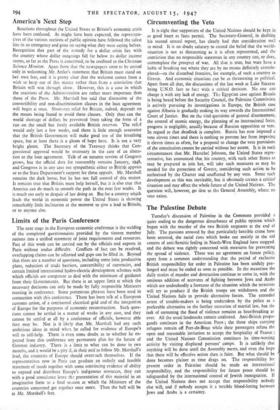Circumventing the Veto
It is right that supporters of the United Nations should be kept in as good heart as facts permit. The Secretary-General, in drafting his second annual report, has clearly had that consideration well in mind. It is no doubt salutary to record the belief that the world- situation is not as threatening as it is often represented, and the conviction that no responsible statesman in any country can, or does, contemplate the prospect of war. All that is true, but wars have a habit of breaking out where they are by no means definitely contein- plated—on the disturbed frontiers, for example, of such a country as Greece. And economic situations can be as threatening as political. Apart from all that, the discussions of the last week at Lake Success bring U.N.O. face to face with a critical decision. No one can charge it with any lack of energy. The Egyptian case against Britain is being heard before the Security Council, the Palestine Commission is actively pursuing its investigations in Europe, the British case against Albania is gradually making its way towards the International Court of Justice. But on the vital questions of general disarmament, the control of atomic energy, the planning of an international force, progress is negligible, usually because of Russian opposition or veto. In regard to that deadlock is complete. Russia has now imposed a veto eleven times and there is nothing to prevent her from imposing it eleven times as often, for a proposal to change the veto provisions of the constitution cannot be carried without her assent. It is in such circumstances that Mr. Herschel Johnson, the United States repre- sentative, has announced that his country, with such other States as may be prepared to join her, will take such measures as may be needed for the protection of Greece, considering such action to be
authorised by the Charter and unaffected by any veto. Some such development as this was inevitable, but it obviously creates a critical
situation and may affect the whole future of the United Nations. The question will, however, go first to the General Assembly, where no veto exists.


































 Previous page
Previous page